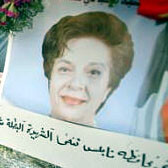
A poster at the funeral depicts Shaden.
Today was the funeral of Shaden Abu Hijleh, a teacher, social activist, humanitarian, wife, mother, and good friend to everyone. Shaden was murdered in cold blood on Friday evening while she was knitting on the steps to the veranda of her home in Nablus. Her husband Dr. Jamal, and her son Sa’ed, an engineer, who were also sitting near her, were injured but have survived their shrapnel wounds.
The soldiers who committed this war crime in front of dozens of eye-witnesses have denied being in the area or at the scene of the shooting. They claim they were not the ones who pulled the triggers.
At 2 p.m., a public gathering began at the hospital morgue, where people assembled to take one last look at Shaden, say goodbye to her, and thus preserve in their memories some of her noble characteristics. The immediate family had arrived earlier.
Since the moment of the murder, the only member of the Abu Hijleh family who had seen Shaden was her son Sa’ed, who was also injured. Today, everyone saw her and everyone cried, even the reporters. The funeral ceremony started and all her friends, family members, colleagues in various charitable organizations, people she had helped in the past and citizens who were outraged at the murder, came together to mourn her loss and say goodbye. There were calls for revenge and demands for the world to do something.
After the burial, speeches were given by the All Party Coordination Committee, the governor of Nablus, humanitarian associates and Dr. Mustafa Barghouti, the head of the Palestine Medical Relief Association, who was visiting Nablus today. Everyone talked about Shaden’s many good deeds, her life history, the crime itself, and the Israeli government’s apparent strategy to drive people out of their homes by any means, including such terroristic acts of murder.
Dr. Jamal Abu Hijleh, the bereaved husband, had the last word. He did not want to talk about his wife’s remarkable character and the good things she did in her lifetime—he noted that all the others had summed this up eloquently. Instead, he emphasized that his family is now even more determined to stay in the country that they have always loved faithfully. Shaden, he said “was an activist for a better life for all Palestinians”. She would never have agreed to leave her country, nor will he or his children, he promised.
I returned to my office in time for Dr. Mustafa Barghouti’s interview in our studios, Radio Tariq Al Mahabbeh. The interview went well, and many people called in, but we did not have time to take any calls as the curfew was nearing. The IDF imposes it by force at 6.00 pm.
It is true that many Palestinians have been murdered, slaughtered and massacred, but Shaden’s killing seems somehow more brutal and shocking. She was wholeheartedly Palestinian. She would move mountains to help people in need.
Later in the afternoon, I learned that IDF army tanks had opened fire on a civilian bus in Jenin killing another Palestinian lady. I do not have all the details, but the victim was probably a wife, mother or sister to people who loved her so much.
The Israeli army still denies any responsibility for killing Shaden. They insist that they were not in the area at the time of murder; they claim it was not they who should be held responsible for this unjust and shocking death. Yet more than fifty people witnessed the two army jeeps entering the street, stopping outside the Abu Hijleh family and opening fire.
“Maybe it wasn’t the Israeli army,” I heard someone say. “Maybe we have a new army that we need to fight. Ha ha, we will be helping the Israelis fight terrorism!” he joked bitterly. His sarcastic words kept echoing in my head.
Sa’ed, after managing to send his mother to hospital before the jeeps returned, was about to be taken to hospital himself when the army jeeps returned and stopped again in the spot where they had eariler committed the crime. Sa’ed leaned out of a window and asked them, “Why did you shoot my mother? Why don’t you try to kill all of us? We are civilians! Why, why, why?!” His shirt was stained with blood at the time. It was obvious that he was one of their victims. The soldier got down from his jeep, raised his gun and aimed, shouting, “GO, go before I shoot again!”
The world is watching, yet has done little. How hard can it get?
Amer Abdelhadi is general manager of Radio Tariq Al Mahabbeh, TMFM 97.7, Nablus

